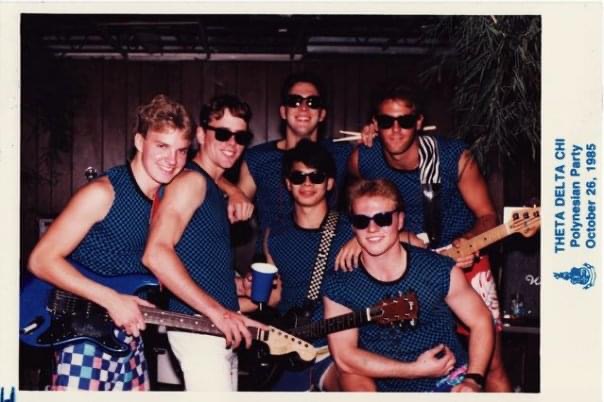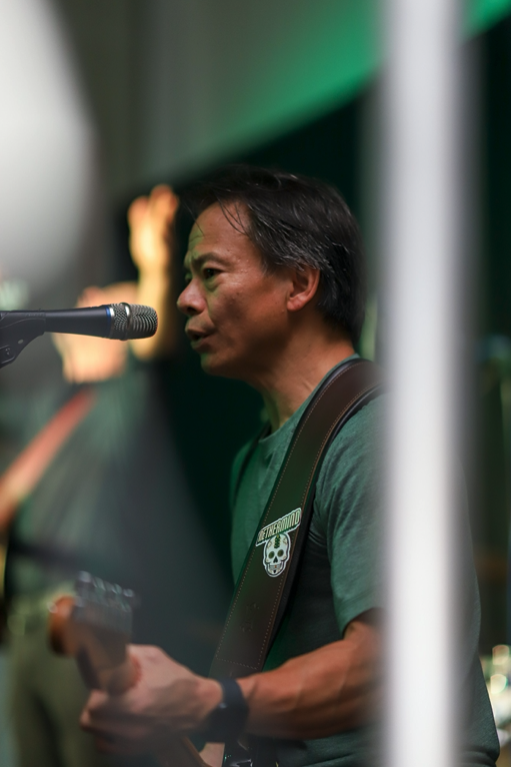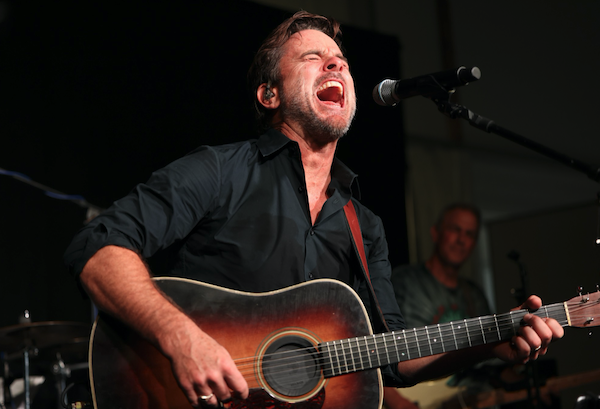Let the Music Take Us Home Again
N’est Pas, a band formed by Theta Delta Chi fraternity brothers in 1984, returned to the stage at Homecoming & Reunion Weekend
October 31, 2022
By
Julia DeKorte ’23
Many things have changed since the first time N’est Pas took the stage at Homecoming & Reunion Weekend in 1985 and the most recent time, just a few weeks ago.
For one, Dennis Whelan ’87 didn’t have to hotwire electricity from a nearby lamppost to power their sound haptics. For another, Chip Puskar ’87, P ’22, an actor and musician known professionally as Charles Esten, had to avoid swarms of fans while getting ready for the show. But a lot of things didn’t change at all, such as the bass guitar that Chris Neikirk ’88 first bought in 1984, or the rowdy, brotherly camaraderie that is abundant in the way that they perform together.
A couple of hours before their show, I sat down with N’est Pas members Whelan, Neikirk, Art Schmalz ’88, Clem Cheng ’86, P ’19 and John “Rocker” Hendrickson ’88 in a small conference room in James Blair Hall to hear the story of how a band formed by Theta Delta Chi fraternity brothers over 30 years ago was still playing together. My first question: How did they get their start?

“One by one,” Whelan described. “Clem, who was the patriarch of this outfit, he picked us all up and said, ‘Hey, you want to play in a band?’” And that was that. Cheng traded his motorcycle for a drum set for Whelan, Neikirk bought a bass guitar and quickly learned how to play, Puskar recruited his friend Hendrickson from high school, and once Schmalz rushed the fraternity in 1984, everything fell into place. Even those who didn’t want to get on stage helped, with Jeff Williams ’88 and Cory DeAngelo ’90 still coming out and running sound and electronics for the band.
Like most people who learn of the band’s name, I wondered, “Why N’est Pas”?
“It’s a strange story,” Neikirk began, chuckling. “We were struggling to come up with a name and we had a foosball table in our fraternity house. I brought it from Roanoke, Virginia. And the name for when your goalie knocks the ball into your own goal — everyone called it a n’est pas — it doesn’t count.”
“It’s a bastardization of the French term, ‘n’est-ce pas,’” Cheng explained. “It’s a pretty bad name, actually.”
While in college, N’est Pas performed for fraternity and sorority parties and formals all over the area, at places such as the University of Virginia, North Carolina State University, Duke University, and of course, William & Mary. They often played until 3 a.m., living up to the slogan they printed on business cards and passed around: “Party music for people who party.” They also performed in North Carolina’s Outer Banks at the Atlantis Beach Club — which closed in 1996 — known for live music performances including those by the Dave Matthews Band.
When I asked how they would describe the atmosphere of their shows, Whelan responded, “Have you ever seen the movie ‘Animal House’?” And that told me all I needed to know.
But through all their shows in swanky night clubs and fraternity basements sticky with beer, Puskar recalled his fondest memories of playing with N’est Pas as the ones that didn’t necessarily go according to plan. With a smile in his voice, he told me the story of a bar where they played for a total of two customers sitting 15 feet from the stage. After appearing at so many big events, the band needed some encouragement, Puskar noticed.
“We’re not going to play this like there’s two people here,” he told them. “We’re not going to play like there’s 10, or 100 or even 1,000. We’re going to play it like we’re in a stadium tonight.” Hendrickson agreed with him, recalling that after their last song, he dramatically threw his guitar pick into the air, only to step down off the stage a few moments later to retrieve it.

Hendrickson, Cheng and Whelan had a different favorite: “It’s burned into my memory,” Whelan said, closing his eyes. “I started doing rim shots on my snare drum at William & Mary Hall [now Kaplan Arena],” he said, pausing as his voice cracked, “and Clem turned around and said, ‘We’re at William & Mary Hall, man!’ And the sound was just reverberating. I could see it now. Like it was yesterday.”
“Being at William & Mary Hall and playing, just so we could say like we are right now, ‘We played at William & Mary Hall,’” Hendrickson said, as he relived that ’we made it’ moment.
This feeling of brotherhood between the band members was apparent throughout our conversation. I asked what N’est Pas has come to mean to each of them over the years, and Whelan summed it up perfectly, with tears in his eyes as he looked to his left and to his right at the bandmates who sat next to him now, just the same as they did 30 years ago. “There are very few things in life as precious as something that can make you cry around your friends when you’re 57.”
Puskar read me the lyrics of a song he wrote for N’est Pas’ 2008 Homecoming performance, titled “Down Memory Lane,” as his answer to this question:
We are older now
But we’re really not somehow
With a beer or two to guide us
To the younger ones inside us
And the past
We thought would last
Turn the amps up
Play it loud
Let the bass notes hit the crowd
Let the music take us home again
Puskar wrote one of the band’s most popular original songs, called “Walk the Bridge,” about the lore of the Crim Dell bridge. Puskar recalled the first time the band played it together: “All of a sudden, the song just comes alive all around me, in their fingertips and in their playing. That was a life-changing moment for me. It set me down the path of where I am today.”

Today, Puskar stars in the hit Netflix show “Outer Banks” as Ward Cameron, and he is regularly swarmed with students wanting a picture or an autograph whenever he visits W&M. He also played Deacon Claybourne in the ABC drama “Nashville,” and was featured on the improv show “Whose Line Is It Anyway.” But he credits his success to his roots at W&M with N’est Pas.
“As much as I love my W&M education — my economics degree, my English and philosophy classes — in a way I majored in N’est Pas. For so much of what I do, it really was a perfect entrée into all those worlds — this band that I love so much.”
Since graduating, each member of N’est Pas has found his own form of success. Schmalz is a partner at the law office of Hunton Andrews Kurth, and is very involved with the Alexandria school district, serving on various committees. Whelan, also a lawyer, was a member of the U.S. High Diving Team prior to going to law school, regularly performing dives from a height of 100 feet or more all around the country. Neikirk is vice president and treasurer of Norfolk Southern, as well as the co-founder of Smartmouth Brewing Co., and Hendrickson is the medical director of Centra Health’s Bridges Treatment Center. Cheng is the senior vice president of human resources at Comcast Corp. and serves on the board of the Philadelphia Chapter of the National Association of American Asian Professionals.
Though accomplished professionals now, the band members still recall the days when they weren’t as put together. Schmalz told me a story of the time they traveled down to Raleigh, North Carolina, in their 1973 Caprice Classic (affectionately named “Dave” and purchased from a fellow fraternity brother for $1) to perform one night, when their car suddenly wouldn’t go over 5 mph – in drive. Ever the crafty problem solver, Whelan spun the car around and drove 50 mph down the highway – in reverse. “We made it safe and sound,” Schmalz said, laughing.
I had one final question for the band. I wanted to know why — though they played whenever they could, though they lived in different cities with different jobs and families to care for — is staying connected to W&M important?
Cheng answered first. “Well,” he started, looking over at his fellow band members, who were already nodding in agreement, “this is where it all happened. This is where we met, where our memories were imprinted.”
“A tree branches out from its roots,” Whelan continued. “And W&M is certainly the roots of us as fraternity brothers, as bandmates, as friends. It all started here.
And finally, in terms of advice, Puskar offered wisdom that nearly brought tears to my eyes as a graduating senior:
“Make the most of your time here. Make sure you get in a canoe on Lake Matoaka before you leave. Make sure you walk all throughout Colonial Williamsburg and see every little nook and cranny. Before you leave, make sure you pick up a guitar and start playing, or do whatever you want, just make sure you don’t leave anything on the bone when you’re done here at school. These will be the memories that stay with you. Find the people that make you even more who you are in all the best ways and hang on tight to them. And hopefully, you’ll have a long time to reminisce together down the road.”